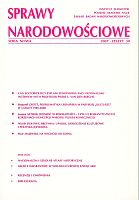Nacjonalizm i szkolne atlasy historyczne
Nationalism and School Atlases of History
Author(s): Tomasz Dominik KamusellaSubject(s): Cultural Essay, Political Essay, Societal Essay
Published by: Instytut Slawistyki Polskiej Akademii Nauk
Keywords: Central and Eastern Europe; education; ethnolinguistic nationalism; school atlas of history
Summary/Abstract: The genre of the school atlas of history originated during the first half of the 19th century in the German Confederation, but it began to flourish only in the other half of this century in the German Empire and Austria-Hungary. Although such atlases made a fleeting appearance in France, the United Kingdom, or Spain, they never gained a permanent place in school curricula. Nowadays in Italy, Germany or Austria atlases of this kind are of auxiliary nature in schools. Quite on the contrary, the school atlas of history remains an obligatory textbook in Central Europe, from Poland through Turkey, and in the European post-Soviet states, whereas schools in the Asian post-Soviet states utilize Soviet school atlases or single-page maps of history. I propose that an explanation of this phenomenon lies in the fact that the ethnolinguistic kind of nationalism constitutes the legitimizing base of statehood in this region. This nationalism entails the isomorphism (or tight spatial overlapping) of national language, nation, and nation-state. Not only is the ideal notoriously hard to achieve, but the simultaneous juggling of linguistic and demographic arguments alongside changes in political borders is equally hard for a schoolchild to grasp without a graphic prop.
Journal: Sprawy Narodowościowe
- Issue Year: 2007
- Issue No: 30
- Page Range: 109-128
- Page Count: 20
- Language: Polish

